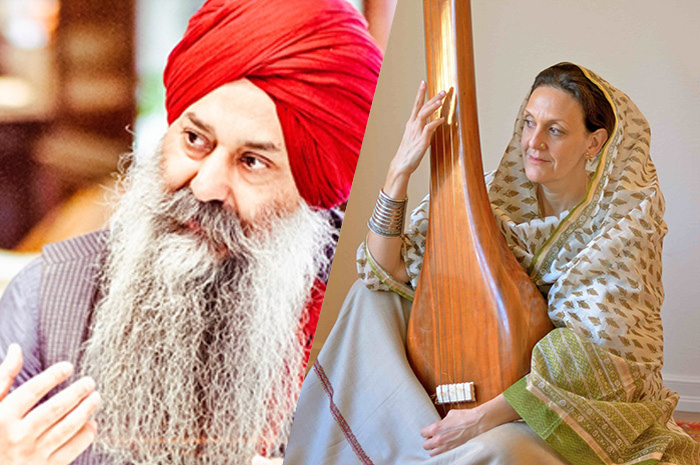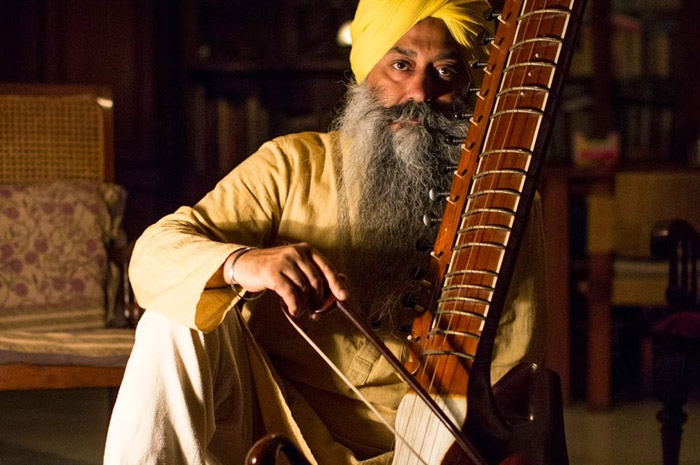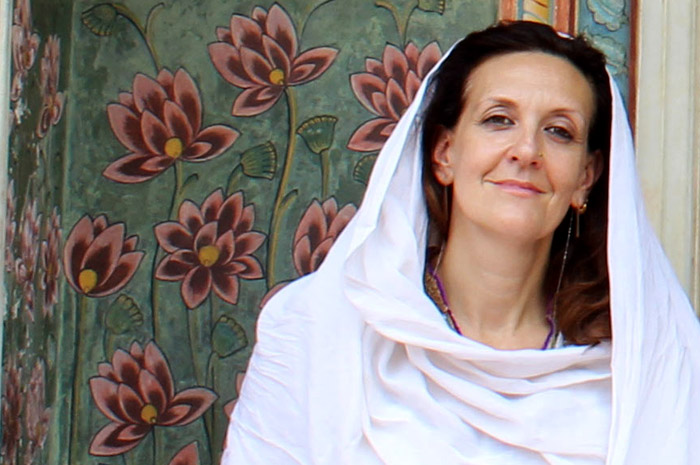2018 Sikh International Film Festival
SATURDAY, NOVEMBER 17
at the Paley Center for Media in New York City
(25 W 52nd St, New York, NY)
Live Concert Featuring Bhai Baldeep Singh
(accompanied by Dr. Francesca Cassio, vocal and tanpura)

Bhai Baldeep Singh
A direct descendant of Gurū Bābā Nanak’s disciple Bhāi Sadhāraṇ, Bhāi Baldeep Singh descends from a long lineage of Gur-Sikh masters of the Gurbāṇī Kīrtana Maryadā, and today is its 13th generation exponent. Bhāi Sadhāraṇ was the 2nd head of the Dharamsāl, the school of learning, founded by Gurū Bābā Nanak at Kartārpur (now in Pakistan) in 1521 AD. Bhāi Sadhāraṇ was also endowed with a Manjī along with bestowed the title ‘Saṅt’ by the 3rd Sikh guru, Sāhib Srī Gurū Amar Das, after successful completion of his unique sewā at the time the Baolī was constructedatGoindwal Sahib. Bhāi Baldeep’s repertoire includes masterpieces that were first composed by the Sikh Gurus and the Bhagats themselves. Bhāi Baldeep is also the prime exponent (khalifā or pagṛī naśīṅ) of this oldest paramparā (tradition) of classical percussions, pakhāwaj/mridang playing of Punjab known as Sultanpur Lodhi – Amritsari Bāj (15th century), a tradition that he has singlehandedly revived.
The Sikh gurus expressed deep spiritual mysteries through musical compositions in chaṅt, vāra as well as the padē or dhurpada gāyan, which has particularly been the music of the devotees of India’s many spiritual traditions. Bhāi Baldeep has been mentored in the dhrupada, vāra and chaṅt genres of Gurbāṇī Saṅgīta by his granduncles Bhāi Avtar Singh (1925-2006) and Bhāi Gurcharan Singh (1915-2017) as well as Ustād Rahim Fahimuddin Dāgar (1926-2011), a 19th generation scion of the Ḍagurvāṇī and Ustād Malikzādā Mohammad Hafīz Khan Khanḍehrē Talwaṅḍiwālē (d. 2009), the 133th exponent of the Khaṅḍarvāṇī.
The Sultanpur Lodhi – Amritsari Bāj is the oldest surviving of all pakhāwaj-joṛī traditions in South-Asia. He is the for-bearer of one of the most illustrious lineages that was once known as Nāyīāṅ-dā-gharāṇā for Bābā Maiyā Singh’s father was the Nāyī (hygienist) of Mahārāja Ranjit Singh. For his field-specific percussion related research and comparative studies, Bhāi Baldeep Singh has also interacted with the exponents of various traditions, such as Padma Shree Paṅḍit Shankar Rao Shindey Appegaonkar, Ustād Gyānī Darshan Singh, Bhāi Narinder Singh, Paṅḍit Laxmi Narayan Pawar, Paṅḍit Gopal Das, Paṅḍit Bal Krishan Sharma, Bhāi Mohinder Singh, Bhāi Balbir Singh, Maharaj Bir Singh Namdhari, Paṅḍit Ram Ashish Pathak, Ustād Altaf Hussain, Bhāi Ranjit Singh, Bhāi Sham Singh, Śri Pawan Kumar Sharma and Paṅḍit Panna Lal Upadhaya of the Gayā gharāṇā. For his vocals related research, he has benefited from his conversations with Professor S. K. Saxena, Professor Sumati Mutatkar, and Sardar Balbir Singh Kalsi of the Agra gharāṇā.
Bhāi Baldeep has inspired interest in the structure of the classic poetic forms found in Gurbāṇī, has revived the rare art of singing the 22 vārs (odes) and other folk based genres, and has awakened the artist elements hidden in the old compositions. In 1988, Bhāi Baldeep undertook a herculean project to revive all the instruments from the Gurus’ times by personally handcrafting them under the guidance of master luthier Gyānī Harbhajan Singh of Village Dandian, Hoshiarpur. Today, he has the unique distinction of having carved the nomadic rabāb (also known as the Hindustanī or dhrupadī rabāb), saraṅdā, tāus, dilrubā, tambūrnī (tanpura), joṛī and pakhāwaj – mridañg. In January 2002, he made a violin based on the Stradivari violin in Spring City, Utah (USA), under the guidance of his friend Paul Hart, a master lute-maker. He has designed four new bows for the tāus, which have been handcrafted by Allan Herou in Paris (2003) and Nicola Galliena in Milan (January and March 2007, January 2008) in addition to making several innovations and inventions in luthiery techniques and designed new tools.
He has also made a detailed 12-hour long audio-visual presentation on the subject, The Musical Instrument of Gurbāṇī and Bhakti Traditions, which has been shown at various universities and conservatories in India and around the world receiving rave reviews. Bhāi Baldeep has inspired people around the world to take up the musical instruments of the Gurus’ court. Many institutions around the world have now included the playing of some of these instruments as a part of their curriculum.
Bhāi Baldeep has developed a comprehensive educative process, which consists of the original practices of nāda yoga, and the modes of teaching-cum-learning traditionally prevalent among the exponents of Gurbāṇī and Bhakti traditions. Besides giving many concerts, he has also conducted workshops, lecture-demonstrations and seminars in India, Europe, North America, Southeast Asia and Australia. Several of his articles, poems and papers have been published in renowned academic journals. Since May 2009, he conducted several interviews for the National television (Doordarshan) and All India Radio (AIR), in which eminent artists and musicians were featured.
In 1997, he received the prestigious Bhāi Batan Singh Memorial Award and Delhi State Annual Award (2002-03) for contribution in the field of Music. He has also been conferred the Sikh Gaurav Award for the year 2003 at Amritsar and in 2007, the Kapurthala Heritage Award at Kapurthala. On August 15, 2011, he received the Punjab State award for his seminal contribution to music (Gurbāṇī Kīrtana and classical music) and the arts, an award which he returned in November 2015 to protest against the Shiromani Akali Dal led Punjab Government’s silence in wake of discrimination against minority communities that led to the lynching of Mohammad Akhlaq at Dadri. In 2014, he also received The Sikh Award (UK). On January 6, 2017, Bhāi Baldeep was honoured by the Bihar Government with the state award —a Certificate of Merit, for his extraordinary contributions during the 350th birth anniversary celebrations of Sāhib Srī Gurū Gobind Singh.
Bhāi Baldeep has been very active in the contemporary Indian cultural scene by producing and publishing recordings of rare Indian musical instruments and contributing to the inter-religious and inter-cultural exchange organizing musical festivals and lectures. Some of his most successful presentations include Laya Darshan: Revealing the Riches of Indian Rhythm in 2005, Jashan in 2006, Anād Kāv Taraṅg in April 2008, November 2009, November 2010, May 2011 and November 2011, Expressions On Nature: Dharti Suhāvī in December 2008 as well as in September 2011, Venice and Punjab: Water Memoirs on February 8, 2010 at the Tagore Theatre, Chandigarh, and 19 full moon series titled Puṅyā Baithak: 31-rāgas in Gurbāṇī at the Qila Sarāi, Sultanpur Lodhi between May 17, 2011, till June 2, 2015.
Bhāi Baldeep is also a sensitive interpreter of the need for a cultural transformation and rejuvenation. He is the Founder and Managing Trustee of The Anād Foundation, a non-profit organization dedicated to the promotion and preservation of traditional culture, with particular focus on the preservation of South Asia’s intangible heritage and cultural traditions. One of The Anād Foundation’s aims is, in fact, to establish institutions as a means of facilitating the recovery and enhancement of the intangible (sūkham virsā) and tangible (sthūla virsā) heritage. Bhāi Baldeep is in the process of re-establishing the Dharamsāla, founded by Gurū Bābā Nanak in 1521 AD, developing it as the Anād Khaṅḍ: Conservatory of Arts, Aesthetics, Cultural Traditions and Developmental Studies, a 120 Crore project at Sultanpur Lodhi, Kapurthala (Punjab). To encourage the young talent to dedicate and express themselves in various artistic forms, including poetry and literature, especially in the vernacular arts, crafts and musical forms, the Foundation confers Anād Sanmān, in the fields of poetry, music, dance, sports, science, technology, art, literature, theatre, cinema and handicrafts. In memory of the Punjabi poetess Baljit Kaur Tulsi, the Anād Foundation organizes since 2008 the poetry festival Anād Kāv Taraṅg and confers the Anād Kāv Sanmān, which is offered to eminent poets and carries a cash prize of Rupees 2.25 lacs, a citation and a tāmra-patra.
Over the years, Bhāi Baldeep has served in many boards and committees notably in the Core Committee of the Khalsa Heritage Complex (Anandpur Sāhib), Executive Committee of the Punjab State Sangeet Natak Academy (2001-3 and 2004-6). He served as a member of the Advisory Council of the Punjab Languages Department (2008-10) and helped the Punjab Government form the Sultānpur Lodhi Development Board in 2007 and served on its Board. He is also a patron of the Kapurthala Heritage Foundation, Kapurthala. From 2009-14 he represented the State of Punjab in the General Council of the National Academy of Music, Dance and Drama (Sangeet Natak Akademi) in New Delhi, where he also served in the Executive Board, in the Advisory Committees for Music, Archives and Documentation and in the Advisory Committee for Grants.
Bhāi Baldeep conceived and curated the Gurū Gaurav 350, Bihar Government’s flagship event held at SKM Auditorium, Patna, to mark the 350th birth anniversary of the tenth Sikh gurū, Sāhib Srī Gurū Gobind Singh. Artists and performers from India and abroad were invited to the 6-day long event which has been considered as the biggest in Bihar’s history. Bhāi Baldeep then conceived and ideated Punjab Government’s concluding ceremony of the Gurū Gobind Singh Sesquicentennial held on December 24, 2017. Bhāi Baldeep has been made the member of the Punjab Government’s committee that was set up in October 2017 to mark the upcoming 550th birth anniversary of Sāhib Srī Gurū Nanak Dev, the founder of Gur-Sikh Paṅth. Since July 1, 2018, he is also serving as Dean, Faculty of Humanities & Religious Studies, Guru Nanak Dev University, Amritsar, in an honorary capacity.
An ardent socio-political activist and a voice for the humbled, he contested the 2014 Parliamentary Elections from Punjab’s Khadoor Sāhib for the Aam Aadmi Party (AAP) and came third with 1,45,000 votes. As an independent political analyst and commentator, Bhāi Baldeep Singh regularly features in debates on some of India’s top television channels. On April 5, 2015, he was suspended from the primary membership of the party for standing against the party leadership for their conspiracy to unethically and unconstitutionally oust various founding members of the party. On April 13, 2016, Bhāi Baldeep, proposed the revival of the Hindostan Ghadar Party, or The Ghadar. Among his many vital contributions and interventions is the ideation of Sarbat Khalsa Movement of 2015 and his initiation of the 2nd Gur-Sikh Gurūdwārā Reform Movement to free the Gur-Sikh institutions freed from state control both, overt and covert.
Dr. Francesca Cassio
Francesca Cassio is Professor of Music at Hofstra University (NY) and since 2011 holds the Sardarni Harbans Kaur Chair in Sikh Musicology. PhD in ethnomusicology from the University of Rome, in affiliation with the Benares Hindu University, since 1994 Dr. Cassio has conducted extensive research in India, where she lived for several years and was trained in Indian vocal music (Dhrupad, Thumri and Gurbani Sangit). She is a senior disciple of Padmabhushan Ustad Rahim Fahimuddin Khan Dagar, Padma Vibhushan Dr. Girija Devi, and Bhai Baldeep Singh.
Accomplished scholar and musician, Dr. Cassio has lectured and performed in India, Bangladesh, UK, Italy, France, Switzerland, and the United States, presenting at prestigious institutions such as Harvard, Yale, Columbia University, Guru Nanak Dev University (Amritsar), University of Delhi, Benares Hindu University, English National Opera, and the Auditorium of Rome, to name a few.
Dr. Cassio is the author of a monograph on Dhrupad, and her essays on Indian music are published in edited volumes and international academic journals.In 2015, she was awarded the Stessin Prize for an outstanding scholarly publication with the article “Female Voices in Gurbani Sangit and the Role of the Media in Promoting Female Kirtanie.”


Film list is subject to change without notice.
